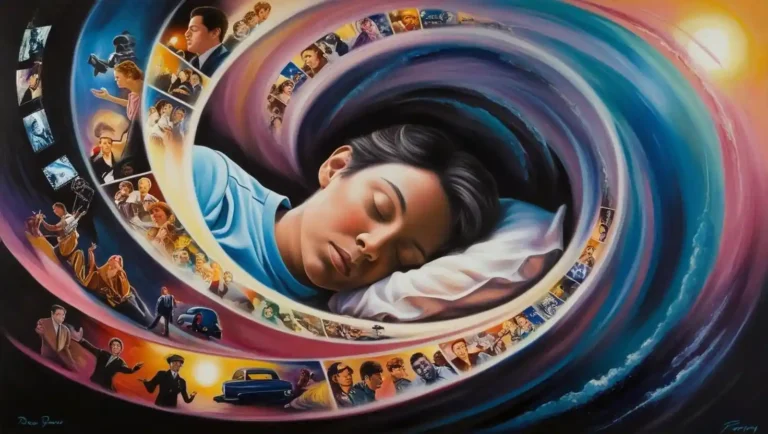Your marital status – whether you are single, married, divorced, or widowed – can have a significant impact on the content and emotional tone of your dreams. Research shows that people in committed relationships tend to dream more frequently about their partners, while singles are more likely to dream about past loves or potential future partners.

Dreams can also reflect the state of your marriage, with themes of conflict, infidelity, or separation foreshadowing real-life relationship issues.
Key Takeaways:
- Married people dream more often about their spouses compared to singles dreaming about their partners
- Dreams about your partner can indicate the health of your relationship
- Divorce and separation often lead to dreams of loss, anger, and anxiety
- Dreams can help process relationship changes and facilitate emotional healing
Related: Link Between Hormones and Dreams
Introduction
Have you ever wondered why your spouse keeps showing up in your dreams? Or why a difficult divorce has you tossing and turning at night? The answer lies in the fascinating connection between your marital status and your dream life.
Numerous studies have found that your relationship status directly influences what you dream about. If you’re married, your spouse is likely to be a frequent guest star in your dreams. But if you’re going through a divorce, you may find yourself haunted by nightmares about your ex.
How Marriage Shapes Dream Content
When you get married, your spouse quickly becomes a central figure in both your waking life and your dream world. One study found that married people dreamed about their partners 20-30% of the time, compared to just 5% for singles dreaming about romantic interests [1].
This reflects the continuity hypothesis of dreaming, which proposes that dream content is a continuation of waking-life experiences and emotions [1].
Get free Dream Interpretation by using our Dream App
Interestingly, the emotional tone of marital dreams tends to mirror real-life relationship satisfaction. Couples in stable, happy marriages often have positive, affectionate dreams about each other. However, spouses dealing with conflict or resentment may have more negative, hostile dreams featuring their partner [4].

Some common partner dream themes include:
- Shared activities (e.g. traveling, visiting friends)
- Talking/interacting
- Erotic encounters
- Separation or being apart [1]
The frequency of partner dreams is also linked to time spent together and emotional investment in the relationship. The more attached you are to your spouse in waking life, the more likely they are to appear in your dreams.
However, not all marital dreams are pleasant or romantic. One study found that spouses dissatisfied with their marriages had more negative dream interactions, such as arguing or infidelity [13]. Dreaming about your partner cheating on you can be especially upsetting, but it doesn’t necessarily mean they are being unfaithful in real life.
Instead, infidelity dreams often symbolize relationship insecurities or a lack of trust [14]. If you’re feeling neglected by your spouse or harboring doubts about their commitment, your subconscious mind may conjure up worst-case scenarios as you sleep. By discussing these dreams with your partner and working on the underlying issues, you can quell the nighttime jealousy.
The Toll of Divorce on Dreams
While marriage generally promotes positive partner dreams, going through a divorce has the opposite effect. Recently separated individuals report more frequent, negatively toned dreams about their exes compared to their single or married counterparts [2].
This is likely due to the intense emotions and life upheaval that accompany the end of a marriage. Divorce is considered one of the most stressful life events a person can experience, often triggering feelings of grief, anger, anxiety, and depression. These turbulent emotions get played out in dreams as the subconscious tries to make sense of the loss.
Some typical post-divorce dream themes include:
- Arguing or fighting with an ex
- An ex abandoning you or being unfaithful
- Trying to win an ex-back
- Reliving happy memories of the marriage [11]
Researchers believe divorce-related dreams serve an important function in the healing process. By allowing the dreamer to process unresolved feelings and rehearse interactions with their ex, dreams can facilitate post-divorce adjustment [2].
However, the road to recovery is often rocky, especially for those prone to depression. One study found that depressed divorcées had fewer positive dream emotions and failed to show the dream content changes that indicated healing over time [2]. This suggests that mood disorders can inhibit emotional adaptation after a split.
Marital Status | Typical Dream Content |
|---|---|
Married | Positive interactions with spouse, shared activities |
Divorced | Negative encounters with ex, themes of loss and abandonment |
Single | Dreams of past loves or potential partners |
Related: How Sexual Content Shapes Our Dreams
Dreams of the Bereaved
The loss of a spouse, whether through divorce or death, can have a profound impact on dream life. For widows and widowers, dreams of the deceased are a common part of the grieving process.
One study found that 58% of bereaved individuals dreamed about their dead spouse, with most reporting positive or neutral dream interactions [15]. These dreams tended to occur more frequently in the first year after the death and often featured meaningful communication or shared activities.
Experts believe dreaming of the deceased serves a comforting function, allowing the bereaved to maintain a connection with their lost loved one. Some spouses even describe the dream state as a temporary “reunion” that eases the pain of the permanent separation [15].
However, as with divorce dreams, the emotional valence of bereavement dreams can vary based on the dreamer’s psychological state. Those struggling with complicated grief or depression may experience more distressing dreams in which the dead spouse is distant, disapproving, or suffering [15].

Gender Differences in Relationship Dreams
Do men and women dream differently about their partners? Some research suggests that gender roles and relationship expectations influence the content of marital dreams.
For example, one study found that women’s dreams focused more on the emotional aspects of their relationships, such as feelings of closeness or insecurity. Men, on the other hand, tended to dream about more concrete, action-oriented interactions with their spouses [12].
Another gender difference emerges in dreams about conflict. Wives are more likely to dream about marital disagreements and aggression than husbands [12]. This may reflect the fact that women are generally more attuned to relationship dynamics and more likely to voice complaints.
However, it’s important to note that gender differences in dream content are often subtle and can vary widely based on individual relationship factors. Ultimately, the emotional tone of your relationship has a much stronger influence on your dreams than your gender alone.
Using Dreams for Relationship Insight
So what can you learn from your relationship-themed dreams? By paying attention to the patterns and emotions in your dreams, you can gain valuable insights into your partnership.
Consider keeping a dream journal to track your nocturnal adventures. Make note of any recurring themes, symbols, or interactions involving your partner. Are your shared dream activities mostly positive or negative? Do you frequently dream about arguments or betrayals?
Discussing your relationship dreams with your spouse can also open up important lines of communication. Share any concerns or insecurities that emerge in your dreams and give your partner a chance to respond. You may find that airing these subconscious worries defuses tension and brings you closer together.
However, resist the temptation to take your dreams too literally. Remember that dreams speak in the language of symbols and metaphors, not precise predictions.
Dreaming about your spouse leaving you doesn’t mean divorce is imminent. But it could indicate an underlying fear of abandonment that’s worth exploring.
If you’re going through a divorce or grieving a loss, be extra gentle with yourself when it comes to unsettling dreams.
Nightmares about an ex or a deceased spouse are a normal part of the healing process. Consider sharing your dreams with a counselor or support group to help you process the emotions they bring up.
The Science of Relationship Dreams
What happens in your brain when you dream about your partner? Neuroimaging studies have found that dreaming activates many of the same brain regions involved in waking social cognition and emotional processing [16].
When you dream about your spouse, areas like the amygdala, which handles emotional memories, and the posterior cingulate cortex, involved in autobiographical memory, show increased activity [17]. This suggests that relationship dreams draw on your real-life experiences and feelings about your partner.
Researchers have also found that dream content can influence next-day mood and behavior toward a partner. One study had participants keep dream diaries and relationship interaction logs. On days following dreams featuring conflict or jealousy, couples reported more negative interactions and lower relationship satisfaction [13].
This finding highlights the power of dreams to color our waking perceptions and emotional states. Even though dreams are “imaginary,” they can have very real effects on our closest relationships.
So the next time your spouse shows up in your dreams, take a moment to reflect on what your subconscious mind might be trying to tell you. By tuning into the hidden messages in your dreams, you just might discover the key to a happier, healthier partnership.
Related: How Desires Shape Your Dreams
Conclusion
From the honeymoon phase to the challenges of long-term commitment, your marital status plays a starring role in your dream life. Married individuals tend to dream frequently about their spouses, with the emotional content reflecting real-life relationship satisfaction.
Divorced and bereaved individuals often grapple with unresolved feelings about an ex or deceased partner in their dreams.
By understanding the common themes and psychological functions of relationship dreams, individuals can gain self-awareness and facilitate emotional healing after a loss.
Paying attention to dream content can provide valuable insights into relationship dynamics and help couples strengthen their bond. So don’t discount that crazy dream about your spouse – it just might be your subconscious mind trying to send you a wake-up call!
References
- Schredl, M. (2021). Partners and Ex-Partners in Dreams: A Diary Study. Frontiers in Psychology, 12, 1-8.
- Cartwright, R. D. (1984). A study of the effects of divorce and depression on dream content. Psychiatry, 47(3), 251-259.
- Schredl, M. (2013). Dreams and Dreaming. In Encyclopedia of Sleep (pp. 214-218). Academic Press.
- Schredl, M., & Reinhard, I. (2011). Dream content and relationship quality: Dream recall and partner dreams. International Journal of Dream Research, 4(1), 28-31.
- Cartwright, R. D. (1991). Dreams that work: The relation of dream incorporation to adaptation to stressful events. Dreaming, 1(1), 3-9.
- Schredl, M. (2019). Researching Dreams: The Fundamentals. Springer.
- Schredl, M., & Göritz, A. S. (2018). Nightmare themes: An online study of most recent nightmares and childhood nightmares. Journal of Clinical Sleep Medicine, 14(3), 465-471.
- Schredl, M., & Reinhard, I. (2008). Gender differences in dream recall: A meta-analysis. Journal of Sleep Research, 17(2), 125-131.
- Schredl, M., Berres, S., Klingauf, A., Schellhaas, S., & Göritz, A. S. (2014). The Mannheim Dream questionnaire (MADRE): Retest reliability, age and gender effects. International Journal of Dream Research, 7(2), 141-147.
- Schredl, M., & Piel, E. (2005). Gender differences in dreaming: Are they stable over time? Personality and Individual Differences, 39(2), 309-316.
- Cartwright, R. D., Lloyd, S., Knight, S., & Trenholme, I. (1984). Broken dreams: A study of the effects of divorce and depression on dream content. Psychiatry, 47(3), 251-259.
- Schredl, M., Sahin, V., & Schäfer, G. (1998). Gender differences in dreams: Do they reflect gender differences in waking life? Personality and Individual Differences, 25(3), 433-442.
- Selterman, D., Apetroaia, A., & Waters, E. (2012). Script-like attachment representations in dreams containing current romantic partners. Attachment & Human Development, 14(5), 501-515.
- Schredl, M., Desch, S., Röming, F., & Spachmann, A. (2009). Erotic dreams and their relationship to waking-life sexuality. Sexologies, 18(1), 38-43.
- Kübler-Ross, E., & Kessler, D. (2005). On grief and grieving: Finding the meaning of grief through the five stages of loss. Simon and Schuster.
- Domhoff, G. W. (2018). The emergence of dreaming: Mind-wandering, embodied simulation, and the default network. Oxford University Press.
- Eichenlaub, J. B., van Rijn, E., Gaskell, M. G., Lewis, P. A., Maby, E., Malinowski, J. E., … & Blagrove, M. (2018). Incorporation of recent waking-life experiences in dreams correlates with frontal theta activity in REM sleep. Social Cognitive and Affective Neuroscience, 13(6), 637-647.






